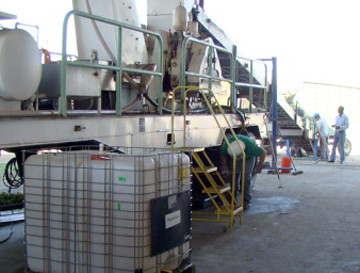Are there cost effective steps that rural communities can take to attract and grow competitive, sustainable energy-related businesses? That was the central question being examined by visiting members of the Organization for Economic and Community Development (OECD) during a series of meetings this fall hosted by USDA Rural Development in four states.
OECD economists and USDA staff met with state and local officials as well as non-profit research organizations and private businesses in Maine, New Hampshire, Oregon and Tennessee during October and November. The meetings examined the impact of federal and state investments in renewable energy production and the impact they have had on economic development in rural communities in recent years.
Meetings across Tennessee examined a wide range of rural renewable energy projects in action. The Memphis BioWorks Foundation spotlighted AgBioworks, a three-state initiative to apply industrial biotechnology to regional crops and forest biomass resources. AgBio aims to develop alternative energy and biobased products from living sources to replace petroleum and other extracted minerals with renewable sources.

Participants spent time at German Farms outside the small town of Whiteville, Tenn. where improved sweet sorghum crops are being put to real-world tests in a proof-of-concept bio-refinery designed to take advantage of former cotton gins. The partnership has already significantly improved the energy potential of the sorghum crop and developed additional income-producing uses for the refinery byproduct. This program has the potential to create a farm-based distributed network of micro-refineries that provide renewable biofuel and jobs in rural areas.
In east Tennessee the group spent time at Genera Energy, a national leader in clean, domestic renewable energy creation and implementation. Genera is building the infrastructure to bring innovation to key energy supply chains and processes from feedstock development to biofuel production and use. Partners include the University of Tennessee, DuPont Danisco, Tennessee Biomass Supply Cooperative, the State of Tennessee, and the U.S. Department of Energy.
Participants also studied solar and geothermal education and training projects along with market-creating investments by the nation's largest public utility, the Tennessee Valley Authority's (TVA) Generation Partners. Tennessee Based Nissan North American, manufacturer of the Leaf all-electric car and an electric refueling station program, the EV Project, presented an update on the creation of publicly accessible biofuel stations along interstates and major highways. Referred to as Green Islands or Green Corridors, such projects require coordination among multiple levels of government and the private sector.
Crossing state boundaries is complicated, but the Southeast Alternative Fuels Task Force is helping align state clean air efforts. OECD members cited Norway and Sweden's work to establish a Midnordic Green Transportation Corridor connecting the Nordic and Baltic seas as evidence that boundaries do not have to be barriers to progress.
It appears there is good evidence that cooperation between governmental organizations and renewable energy providers can provide environmental benefits while enabling businesses to create jobs in the growing renewable energy sector. The OECD report is scheduled to be released early in 2012.


